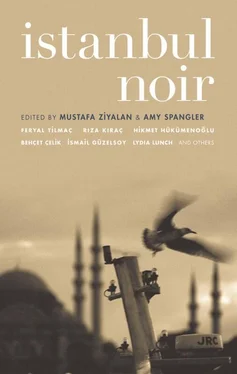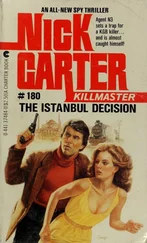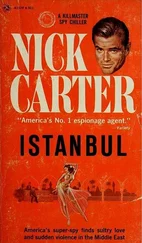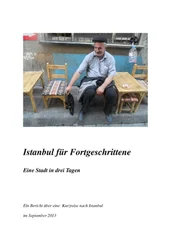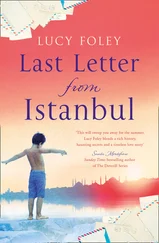“I know, sweetheart,” said Zeynep, smiling. She reached out and ran her hand through Neşe’s long red hair. Neşe gently leaned in toward her.
“You weren’t his first lover. I couldn’t even count how many there’ve been. But even I wasn’t able to leave him, so how could a little angel like you possibly have done it?”
She thought of all the beatings she’d taken, all the slaps to the face, for some bullshit reason or another. But now, all that was over.
Zeynep slipped her arm around the waist of the younger woman, who snuggled up next to her, resting her head on Zeynep’s shoulder.
Two large seagulls passed in front of them, so closely that if they’d reached out, they could have touched them.
Part II
Pushing Limits, Crossing Lines
The smell of fish
by Hıkmet Hükümenoğlu
Rumelihisarı
Cemile Abla had a bad habit. It was a habit that tormented her so much it gave her stomach cramps. But other than that, she was a fairly carefree woman. No one had ever heard her complain, not even when her knees ached on rainy days. She was just grateful to have friends who came knocking at her door frequently enough to make her forget her loneliness. She had enough money to buy meat twice a week, and a house with a roof that never leaked in the winter. In fact, according to Nalan, if Cemile Abla would only, finally, sell her two-story wooden home, she’d have plenty of money to squander for the rest of her life.
“Your house stands out like a rotten tooth in the middle of all these new ones,” Nalan had told her. Nalan was a tiny woman whose hair had begun to thin out a couple of years before, but her skin was still as smooth and shiny as could be. She and Cemile Abla had been best friends ever since they were kids. Their mothers — may they rest in peace — had been neighbors for fifty years. When her oldest son got married, Nalan sold her house in Rumelihisarı and bought a new three-bedroom apartment in a faraway neighborhood — and, as she had told Cemile Abla, she’d made enough money off the deal to pay for her son’s lavish wedding to boot. Nalan’s was the one and only house on her street that hadn’t changed hands to be demolished and replaced by an expensive apartment building with a view of the Bosphorus.
Cemile Abla’s wooden house stood all alone, tall and proud at the top of the stone stairs, a bastion of the past. The neighborhood real estate dealer was constantly at her heels, yapping like a newborn puppy. If he could just convince her to sell, he’d make a small fortune on the commission alone.
But no matter how suffocated she felt by the profusion of restaurants along the shore — a new grand opening every week! — the throngs of graduates of the nearby university storming in for Sunday breakfast with their entire families in tow (Nalan complained, saying they probably didn’t have any eggs of their own at home), and all the automobiles jamming the avenue, Cemile Abla was determined not to sell her house — no matter what. Luckily her friends’ and the real estate dealers’ insistence never went beyond harmless banter; she knew deep down that if they’d pressed her just a bit more, there’s no way she could have said no.
Cemile Abla had gone shopping at the supermarket to get ready for the guests she was entertaining that evening. For her everyday needs she went to the little ant-infested grocer down the hill, but on special days like this one, she preferred browsing the big stores with their wheeled carts and long corridors illuminated by glaringly bright lights. It gave her that same dizzying sense of exhilaration that she used to get back as a senior in high school after a reluctant visit to the amusement park, at the insistence of friends.
She had decided to offer her guests chocolate cake and canapes on white bread with tea. Having bought a jar of the most expensive cocoa, a container of French mustard, and a few of what the man at the deli counter told her were the best cheeses of Italy, she headed home, inhaling the scent of the Bosphorus along the way. From a short distance away, her eyes met with those of Captain Hasan, and she smiled. Captain Hasan must have come back from fishing early, for it was uncommon to see him on the shore at that time of day. He was sitting on a low stool on the edge of the sidewalk, an extinguished cigarette stuck in the corner of his mouth, leaning over, trying to teach the scrawny boy he’d recently hired how to tie knots. His red and blue boat rode the gentle waves just behind them. (“A person who has a ship, not a boat, is called a captain,” Cemile Abla had complained at the age of seven. Her father had patted her head and replied, “If that’s the way Hasan likes it, then what’s it to us?”)
“I’ve got a three-and-a-half-kilo bluefish for you,” Captain Hasan said joyfully. “Caught him at the crack of dawn, he must’ve been drunk, fell for it hook, line, and sinker!”
“Thanks, but my refrigerator’s already crammed full,” replied Cemile Abla, placing her bags on the ground on either side of her. “Give it to someone else, it would be a sin to waste it.”
“No way, it’s for you. Nobody else knows how to cook it right. They’d make a mess of the poor thing... So, you want me to bone it or you want to do it yourself?”
Cemile Abla took a deep breath, turned her eyes to the clouds, exhaled, and answered, “I’ll take care of it. Thanks.”
It was said that nobody along the entire Bosphorus could clean a fish as well as Cemile Abla. It was from her father that she’d learned to work a fish so deftly. On her way home from school, she used to stop by the stand that once stood on the right side of the pier. There she would remove one squirming, restaurant-bound fish at a time from the shallow tubs of water and cut off their heads and tails before scaling and skinning them; the bigger ones she would bone as well. When she was still too short to reach the counter, she’d prop herself up by standing on an old cheese tin. Then she’d run home and watch cartoons for half an hour, munching on some bread and jam that her mother had prepared for her, before starting on her homework. Actually, if she’d gone straight home instead of stopping by the fish stand, she would have had an extra hour to watch cartoons. But she was more fond of the knives and the fish than she was of TV. With each day her fingers grew a little more used to the tools, her wrists stronger, her movements more graceful. Nothing could take the place of that odd feeling she would get. Every now and then her teachers would scold her because her hands smelled of fish, but it was worth it just to see the proud smile on her father’s face as he watched her working at the counter. And it wasn’t only her father who held her in such affection; she’d become the apple of everyone’s eye, all the way from Ortaköy to Sarıyer. Awed by her love of fish and her skilled mastery of the knife, each and every fisherman, young and old alike, saw Cemile Abla as his own ideal daughter, sister, or even wife. And the fact that her father was the famous Ali Reis didn’t hurt either.
The scrawny boy was off in his own little world, watching a sports car drive by, when Captain Hasan slapped him on the back of the neck. “Get off your ass and help Cemile Abla with her bags!” he yelled. “You some kinda idiot, boy? Do I have to tell you everything? And wrap that fish up.”
“There’s really no need, Captain Hasan, I can carry the bags myself,” said Cemile Abla. “They’re not heavy anyway.”
But she knew what would happen. The man would insist, and once again she wouldn’t be able to say no. Cemile Abla was annoyed with herself. Sometimes she even hated herself for giving up so easily, for acquiescing to things she really didn’t want to do. But no matter how hard she tried, she could never manage to say no when people persisted with her. She became horrified, thinking that if she said no she’d be thought rude, or that she’d insult the other person, or hurt their feelings; she’d get a lump in her throat and her palms would grow sweaty. She wouldn’t be able to look the other person in the eye; she just couldn’t stand the thought of how that person’s eyes would dull with disappointment as soon they heard the word “no.” And so that was her constant dilemma. She’d have to drink that third cup of coffee despite her heartburn, go shopping with the girls even if she preferred to do so alone, go picnicking at Kilyos with her old neighbors even though she really didn’t feel comfortable wearing a swimsuit.
Читать дальше
